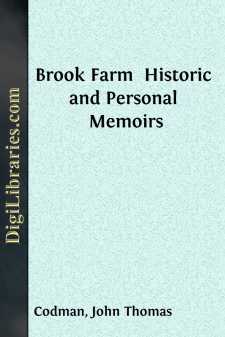Categories
- Antiques & Collectibles 13
- Architecture 36
- Art 48
- Bibles 22
- Biography & Autobiography 813
- Body, Mind & Spirit 142
- Business & Economics 28
- Children's Books 15
- Children's Fiction 12
- Computers 4
- Cooking 94
- Crafts & Hobbies 4
- Drama 346
- Education 46
- Family & Relationships 57
- Fiction 11828
- Games 19
- Gardening 17
- Health & Fitness 34
- History 1377
- House & Home 1
- Humor 147
- Juvenile Fiction 1873
- Juvenile Nonfiction 202
- Language Arts & Disciplines 88
- Law 16
- Literary Collections 686
- Literary Criticism 179
- Mathematics 13
- Medical 41
- Music 40
- Nature 179
- Non-Classifiable 1768
- Performing Arts 7
- Periodicals 1453
- Philosophy 64
- Photography 2
- Poetry 896
- Political Science 203
- Psychology 42
- Reference 154
- Religion 513
- Science 126
- Self-Help 84
- Social Science 81
- Sports & Recreation 34
- Study Aids 3
- Technology & Engineering 59
- Transportation 23
- Travel 463
- True Crime 29
Brook Farm Historic and Personal Memoirs
Categories:
Description:
Excerpt
CHAPTER I.
THE DEVELOPMENT OF THE BROOK FARM MOVEMENT.
Early in the present century, New England was the centre of progressive religious thought in America. A morbid theology had reigned supreme, but its forms were too cold, harsh and forbidding to attract or even retain the liberal-minded, educated and philosophic students of the rising generation, or hold in check the ardent humanitarian spirit, that embodied itself in ideals that were greater than the existing creeds.
Yet nowhere prevailed a more religious spirit. It showed itself in tender care of masses of the people, in public schools and seminaries, in lectures, sermons, libraries and in acts of general benevolence.
From these conditions developed the idea of greater freedom from social trammels; from African slavery, which had not then been abolished; from domestic slavery, which still exists; from the exploitations of trade and commerce; from the vicious round of unpaid labor, vice and brutality. Protestations were heard against all of these evils, not always coming from the poor and unlearned, but oftener from the educated and refined, who had pride that the republic should stand foremost among the nations for justice, culture and righteousness.
The old theology was crumbling. A new church was springing from its vitals based on freer thought, in which the intellect and heart had more share in determining righteousness. The fatherhood of God and the brotherhood of man became the themes of discourse, oftener than those of the vengeance of an offended Deity; and pity and forgiveness, oftener than those on everlasting punishment.
In truth, the new departure which had begun, soon attracted to itself the most cultivated persons of the time, some of whom, Sept. 19, 1836, formed a club that met at one another's houses and discussed all the important social and religious topics of the day. They were mostly young people, college-bred, learned, artistic and thoughtful, and of high ideals in intellectual acquirement, religion and social life. They were all agreed that there were many evils to be eradicated from society; in what way—individualistic, governmental or socialistic, or by a combination of ways—few were agreed.
The problem was an open one. The theories proposed and the discussions were extremely interesting, but no record of them is at hand, except a few essays published in the Dial, a quarterly magazine which was edited by members of the organization, which finally took the name of "The Transcendental Club." One of the Dial editors, as well as one of the founders of the Club, and at whose house it had its first meeting, was Rev. George Ripley, a Unitarian minister who was born at Greenfield, Mass., in the beautiful valley of the Connecticut River. He was of good farmer stock and had a fine physical presence, though of medium stature. He was a lover of books, a graduate of Harvard college, and a well trained and religious scholar. He was then settled over a Unitarian church worshipping on Purchase Street, in Boston, and faithfully fulfilled his duties....


